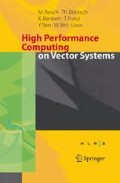Abstract
Large scale atomistic simulations are feasible only with classical effective potentials. Nevertheless, even for classical simulations some ab-initio computations are often necessary, e.g. for the development of potentials or the validation of the results. Ab-initio and classical simulations use rather different algorithms and make different requirements on the computer hardware. We present performance comparisons for the DFT code VASP and our classical molecular dynamics code IMD on different computer architectures, including both clusters of microprocessors and vector computers. VASP performs excellently on vector machines, whereas IMD is better suited for large clusters of microprocessors. We also report on our efforts to make IMD perform well even on vector machines.
Access this chapter
Tax calculation will be finalised at checkout
Purchases are for personal use only
Preview
Unable to display preview. Download preview PDF.
References
F. Ercolessi, J. B. Adams, Interatomic Potentials from First-Principles Calculations: the Force-Matching Method, Europhys. Lett. 26 (1994) 583–588.
P. Brommer, F. Gähler, Effective potentials for quasicrystals from ab-initio data, Phil. Mag. 86 (2006) 753–758.
G. Kresse, J. Hafner, Ab-initio molecular dynamics for liquid metals, Phys. Rev. B 47 (1993) 558–561.
G. Kresse, J. Furthmüller, Efficient iterative schemes for ab-initio total-energy calculations using a plane wave basis set, Phys. Rev. B 54 (1996) 11169–11186.
G. Kresse, J. Furtmüller, VASP — The Vienna Ab-initio Simulation Package, http://cms.mpi.univie.ac.at/vasp/
J. Stadler, R. Mikulla, and H.-R. Trebin, IMD: A Software Package for Molecular Dynamics Studies on Parallel Computers, Int. J. Mod. Phys. C 8 (1997) 1131–1140 http://www.itap.physk.uni-stuttgart.de/~imd
M. S. Daw, M. I. Baskes, Embedded-atom method: Derivation and application to impurities, surfaces, and other defects in metals, Phys. Rev. B 29 (1984) 6443–6453.
G. S. Grest, B. Dünweg, K. Kremer, Vectorized Link Cell Fortran Code for Molecular Dynamics Simulations for a Large Number of Particles, Comp. Phys. Comm. 55 (1989) 269–285.
R. Everaers, K. Kremer, A fast grid search algorithm for molecular dynamics simulations with short-range interactions, Comp. Phys. Comm. 81 (1994) 19–55.
Author information
Authors and Affiliations
Editor information
Editors and Affiliations
Rights and permissions
Copyright information
© 2006 Springer-Verlag Berlin Heidelberg
About this paper
Cite this paper
Gähler, F., Benkert, K. (2006). Atomistic Simulations on Scalar and Vector Computers. In: Resch, M., Bönisch, T., Benkert, K., Bez, W., Furui, T., Seo, Y. (eds) High Performance Computing on Vector Systems. Springer, Berlin, Heidelberg. https://doi.org/10.1007/3-540-35074-8_12
Download citation
DOI: https://doi.org/10.1007/3-540-35074-8_12
Publisher Name: Springer, Berlin, Heidelberg
Print ISBN: 978-3-540-29124-4
Online ISBN: 978-3-540-35074-3
eBook Packages: Mathematics and StatisticsMathematics and Statistics (R0)

